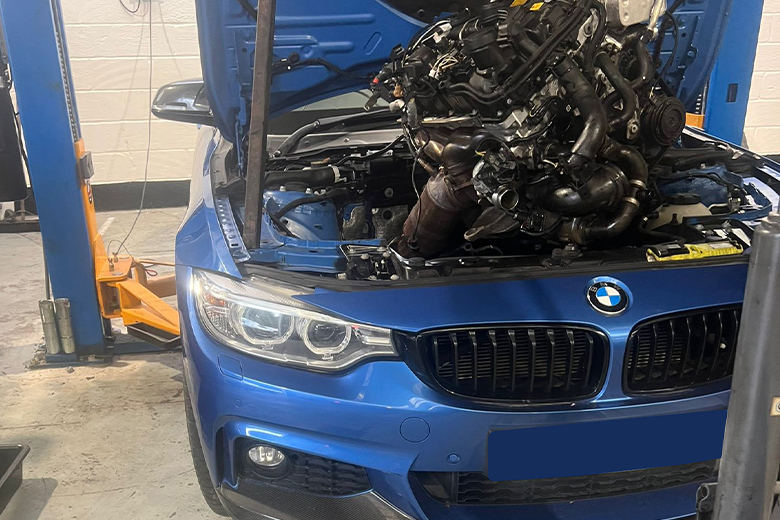Understanding BMW Engine Replacement: When and Why You Might Need It

May 29, 2024
Revitalise Your BMW: When and Why Engine Replacement Is Essential
In the field of automotive engineering only few names are as respected and esteemed as BMW. BMW vehicles are known for luxury, performance, and precision. They stand for best in the automotive craftsmanship. Yet even these finely tuned machines are not immune to ageing and the wear and tear of everyday use. Every BMW is powered by an engine which is a marvel of engineering. However every car owner have to face the potential of BMW engine replacement at some point in their lives.
If you are a BMW enthusiast or owner then understanding subtleties of engine replacement is essential. They are vital to keeping your driving experience excellent. It covers precise signs that hint at engine trouble. It also explains why replacing the engine is often best course of action. This guide has many insights. Join us on a journey through BMW engine replacement. We will explore when and why this tricky procedure might be needed for maintaining the performance, reliability, and glamour of your beloved BMW.
Understanding the Replacement Process
Understanding the replacement process is vital for BMW owners with engine problems. Typically professional technicians do a thorough assessment. They establish the extent of the problem and whether replacement is required. Once confirmed the old engine is gently removed. Then the vehicle components are checked for any damage.
The new engine is sourced from BMW or a reliable aftermarket supplier. It is then precisely installed and calibrated to ensure optimal performance. Before returning the car to the owner, it is thoroughly tested to ensure functionality and resolve any potential concerns. The process may differ depending on the model and dealership or repair business. Great attention to detail is important to ensure the lifetime and dependability of the replacement engine.
When Should You Consider Engine Replacement?
Excessive Mileage
One of the primary reasons for engine replacement is high mileage. As time passes the components of your engine wear down due to constant use. Even while BMW engines are made to last wear and tear can still affect them. It may be time to consider a replacement engine if your BMW has travelled a considerable distance usually more than 150,000 miles and you begin to notice performance problems like power loss, excessive oil use, or knocking noises.
Catastrophic Engine Failure
Even with routine maintenance, unanticipated events can occasionally result in catastrophic engine failure. This could be due to many reasons. These reasons include manufacturing defects, poor maintenance, or accidents. If your BMW engine suffers damage that cannot be repaired such as a cracked block or a seized piston then replacing your engine might be the only feasible solution.
Persistent Mechanical Issues
Despite their reputation for high end and sophisticated engineering BMW vehicles occasionally experience mechanical issues. You might face problems repeatedly even after repairs. These problems may include overheating, coolant leaks and persistent check engine lights. These issues could show serious problems inside the engine. In these situations replacing the engine might be a more cost effective solution than attempting to fix each issue individually.
Emission Failures
Emission standards become increasingly stringent nowadays. Older BMW engines may struggle to meet the requirements. If your BMW fails emissions tests consistently due to high levels of pollutants, it might be a sign that the engine is no longer capable of functioning within acceptable parameters. Replacing the engine with a more modern, energy-efficient type could help guarantee that emissions standards are met.
Why Should You Opt for Engine Replacement?
Restore Performance
As the time passes wear and tear can diminish the performance of your BMW vehicle. It results in reduced power output, decreased fuel efficiency and overall driving satisfaction. Engine replacement allows you to restore the performance of your BMW to its original glory. It ensures smooth acceleration, responsive handling and optimal fuel economy.
Enhanced Reliability
A new engine means enhanced reliability. Compared to older models, replacement engines frequently offer greater longevity and durability. This is because of improved materials and modern manufacturing techniques. By making the investment in engine replacement you can have peace of mind knowing that your BMW is outfitted with a dependable, long-lasting powerplant.
Preserve Resale Value
If you are considering to sell your BMW vehicle in the future then having a recently replaced engine can significantly increase its resale value. Prospective buyers are more likely to be attracted to a vehicle with a fresh engine. It indicates that the car has been well-maintained and is less likely to have serious issues in the near future.
Safety
A failing engine can compromise your safety on the road. From sudden stalls to loss of power while driving, engine-related issues pose a serious risk to both you and other road users. By replacing a faulty engine, you are prioritizing safety. You are also ensuring that your BMW continues to be a dependable vehicle.
Summing It Up
Replacing an engine may seem daunting, especially for a precision-engineered vehicle like a BMW. But, it is often needed to keep performance, reliability, and safety. You can understand signs that show the need for engine replacement and the benefits it offers. This understanding can help you make informed decisions to keep your BMW running well for years. It can restore performance, boost reliability, and ensure compliance with emissions laws. Replacing the engine can breathe new life into your BMW and extend its time on the road.